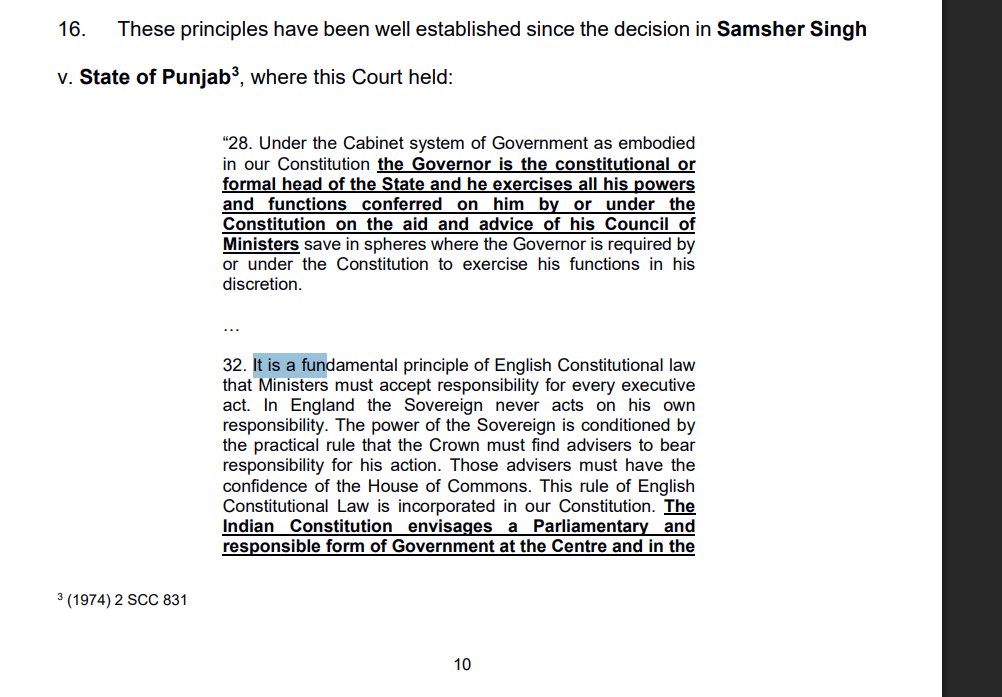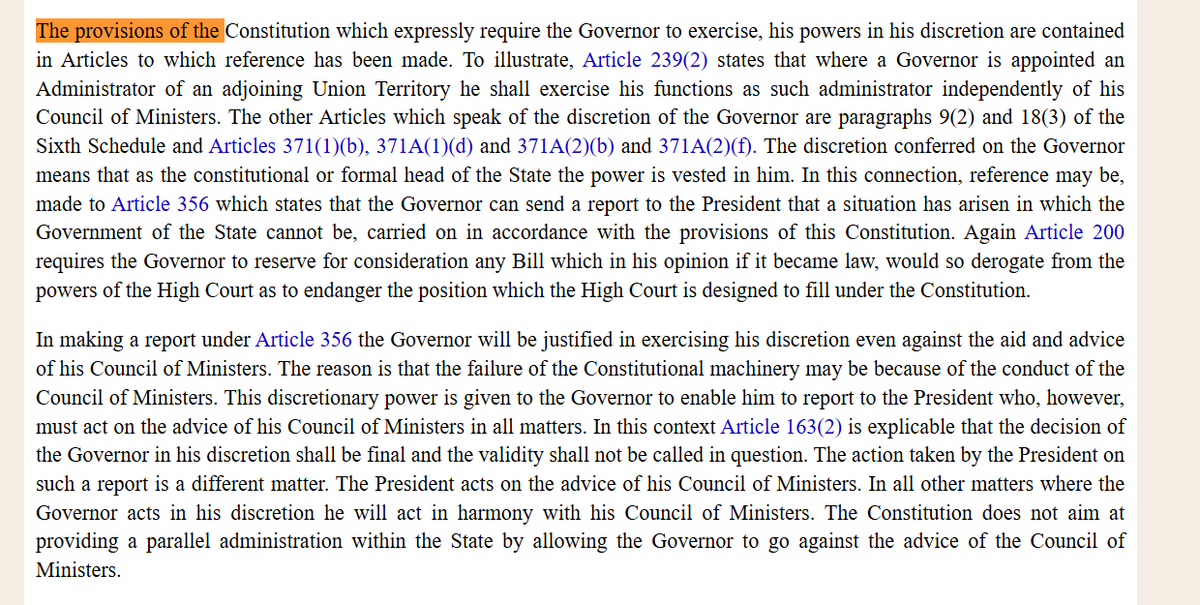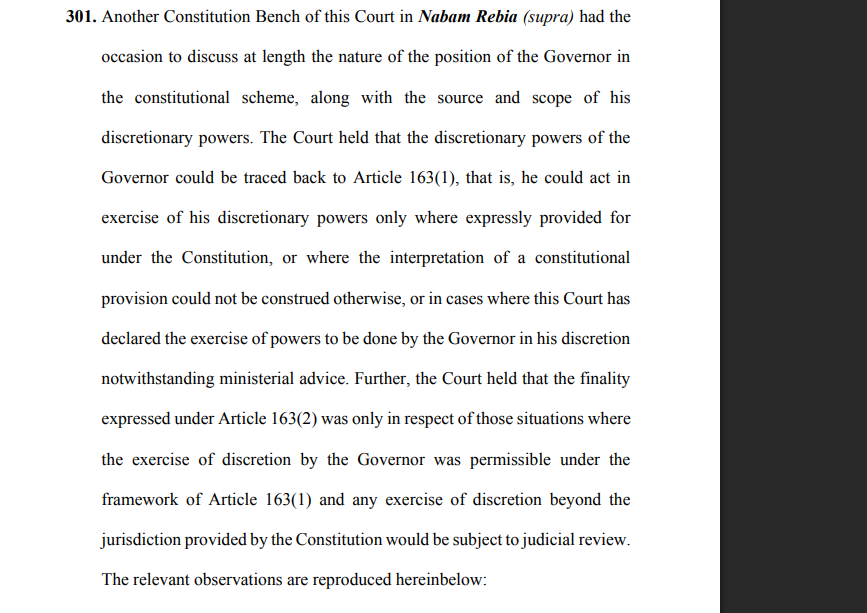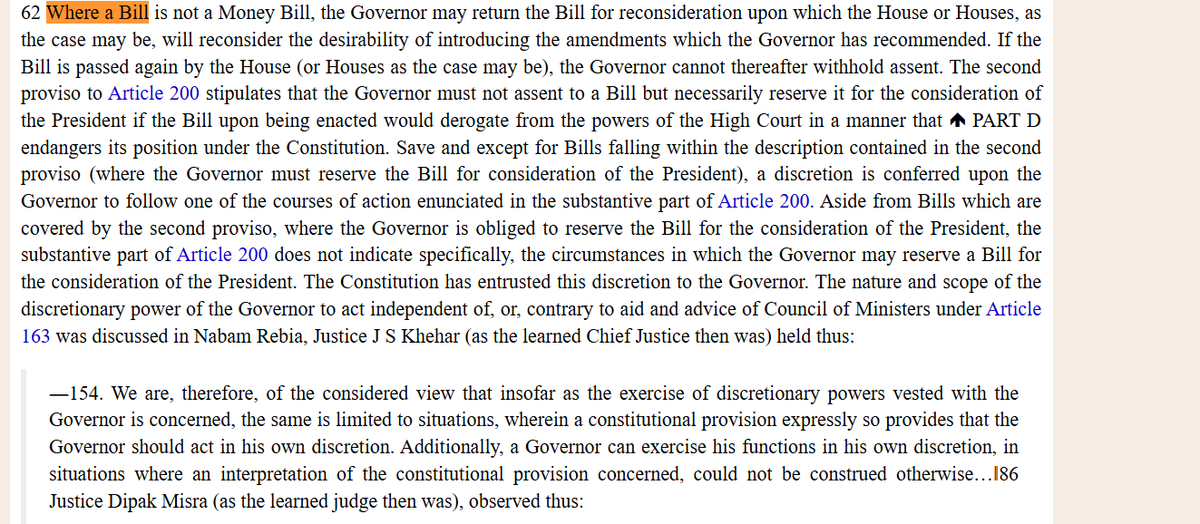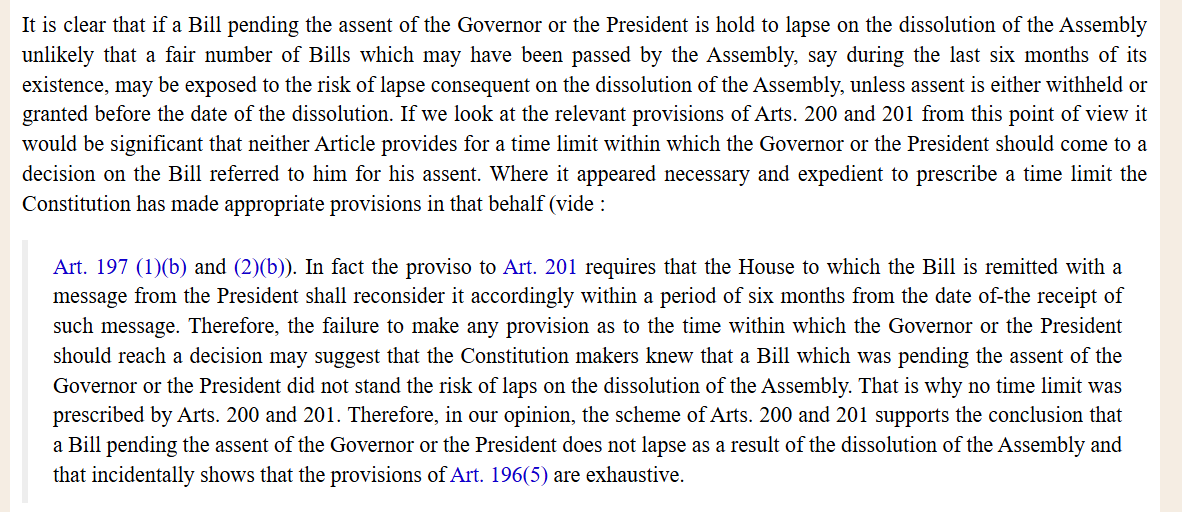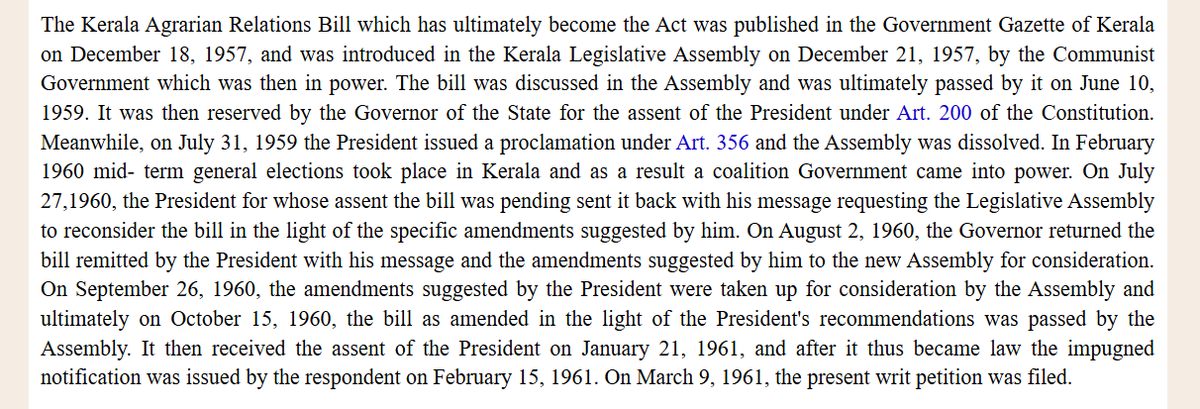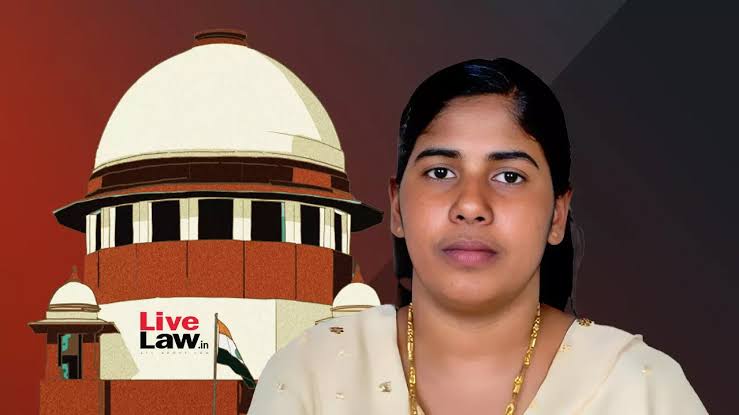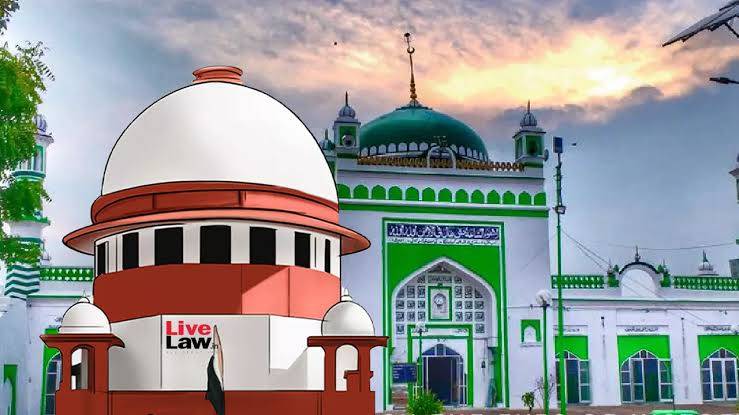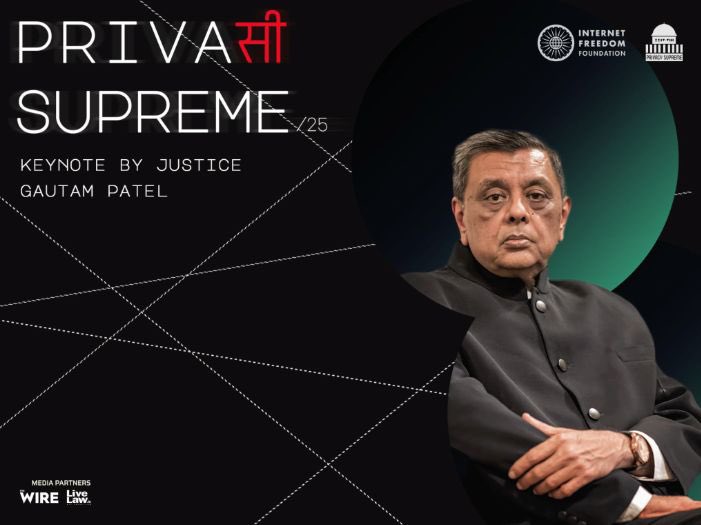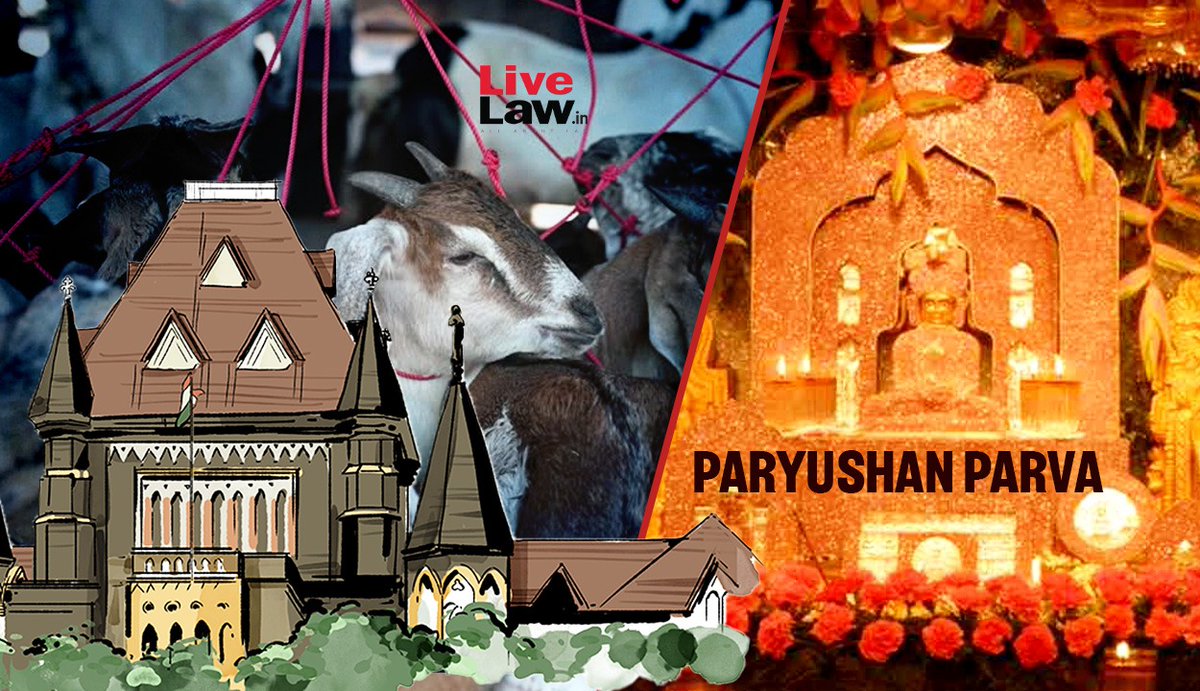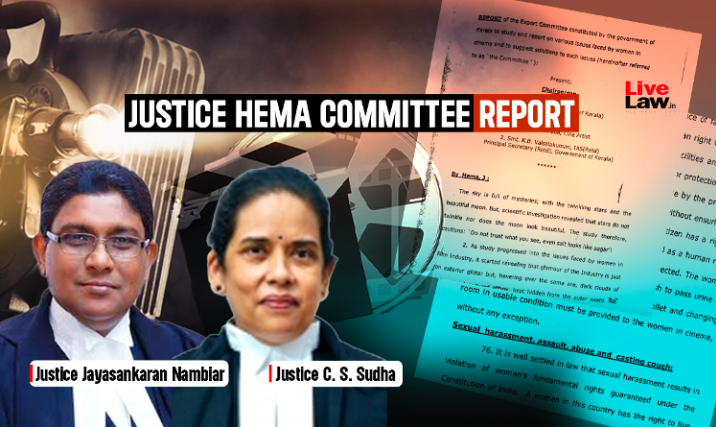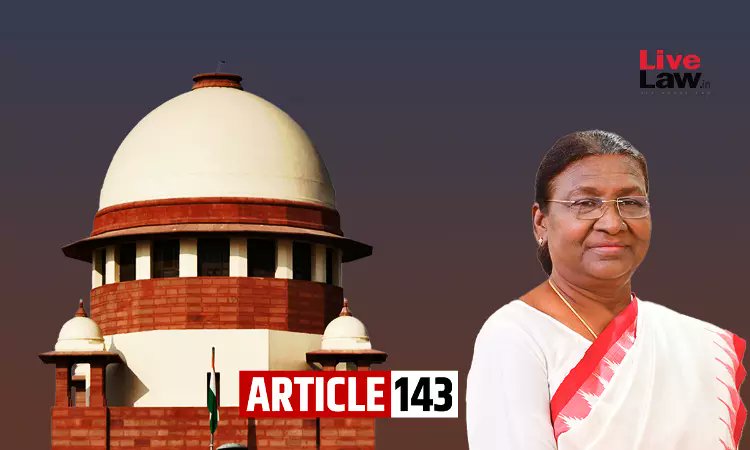#SupremeCourt constitution bench to continue hearing today Presidential Reference by President Droupadi Murmu (@rashtrapatibhvn) on 14 questions on the power to assent on Bills, including whether Court can fix timelines for the President/Governor to decide on Bills. 
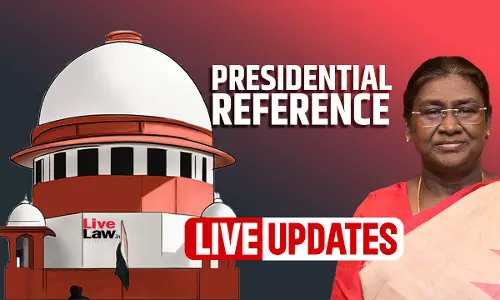
@rashtrapatibhvn The Presidential Reference, made under Article 143, came a month after Supreme Court's judgment in Tamil Nadu Governor's matter, wherein the Court held that the Governor did not act bona fide in reserving Bills to President. It held those bills as deemed assented.
@rashtrapatibhvn In the judgment passed by Justices JB Pardiwala and R Mahadevan, the Court held that the President must act on the Bills reserved for her under Article 201 within 3 months: livelaw.in/top-stories/pr…
@rashtrapatibhvn Here is the 14 questions asked by President Murmu:
livelaw.in/top-stories/su…
livelaw.in/top-stories/su…
@rashtrapatibhvn A Presidential Reference is heard by a constitution bench and therefore, a five-judge bench: 
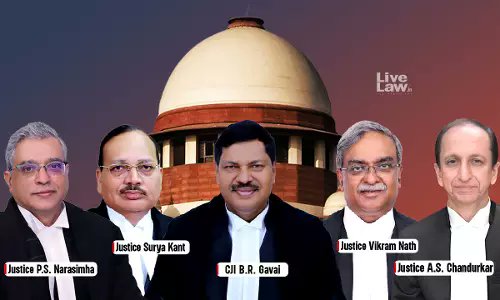
@rashtrapatibhvn Follow the thread on yesterday's proceedings:
https://x.com/LiveLawIndia/status/1958019007145009241
@rashtrapatibhvn Read our reportage on Presidential Reference: livelaw.in/gsearch?q=pres…
@rashtrapatibhvn Solicitor General Tushar Mehta to continue his arguments.
SG: Governor shall declare, he has three options- grant assent- facets of it? at the outset, if he grants assent, Bill becomes Act. If he defers, he can take decision and resort to proviso and return the Bill, fourth option. Bill is returned with or without modification.
What is second? withhold- standalone option-complete action
CJI: According to you, Punjab is wrongly decided?
SG: yes. At outset, if he withholds, patently unconstitutional, the bill falls through. Question is- instead of taking this route, he resorts to the proviso- it is returned to the House and if comes back, he has two options- he can assent or reserve. Third, one new element, when the reserves at outset, first can be for repugnancy. Certain provisions in Constitution mandates state legislature passing law, Presidential assent required- for instances, Article 31(3) etc.
What is second? withhold- standalone option-complete action
CJI: According to you, Punjab is wrongly decided?
SG: yes. At outset, if he withholds, patently unconstitutional, the bill falls through. Question is- instead of taking this route, he resorts to the proviso- it is returned to the House and if comes back, he has two options- he can assent or reserve. Third, one new element, when the reserves at outset, first can be for repugnancy. Certain provisions in Constitution mandates state legislature passing law, Presidential assent required- for instances, Article 31(3) etc.
@rashtrapatibhvn SG: All four options are independent.
SG: second question, which I am addressing- whether Governor is bound by aid and advice tendered by Council of Ministers- Article 163(1)-functions can be based on discretion or aid and advice. What is the demarcation? that's the question.
The Constituent Assembly debate relevant is-Kamath objected the addition of discretion. This argument is responded by Mahavir Tyagi.
The Constituent Assembly debate relevant is-Kamath objected the addition of discretion. This argument is responded by Mahavir Tyagi.

@rashtrapatibhvn SG: there can be a vacuum, when one ministry goes
CJI: whenever there is President's rule, there are advisors to the President
SG: Governor calls out leader for choice of minister, after previous dissolved, who will be to advice him? he has to act in his discretion.
CJI: whenever there is President's rule, there are advisors to the President
SG: Governor calls out leader for choice of minister, after previous dissolved, who will be to advice him? he has to act in his discretion.
@rashtrapatibhvn SG: I have quoted Seervai on what is the discretionary powers of Governor and President. I have referred judgments on discretion [of Governor and President].
@rashtrapatibhvn SG: [reading judgment on whether discretion can be exercised] 1. expressely provided 2. where legislative intent emerging from interpretation- Article 356 for eg. 3. whether constitutional court declares 4. where bias is inherent in aid and advice- sanction under PC Act
@rashtrapatibhvn SG: Shamsher Singh judgment takes note of in Punjab judgment but relevant paragraphs missed. Only two paragraphs are noticed.
@rashtrapatibhvn SG: Article 200 where Governor may act in his own discretion. In TN judgment, this is distinguished relying upon concurring option of a judge in this case. Next is MP Police judgment which is not noticed. 

@rashtrapatibhvn SG: Now, I came to most important judgment-Nebam Rebia-escaped the attention in Punjab judgment, quoted in Tamil Nadu but important paras missed. 
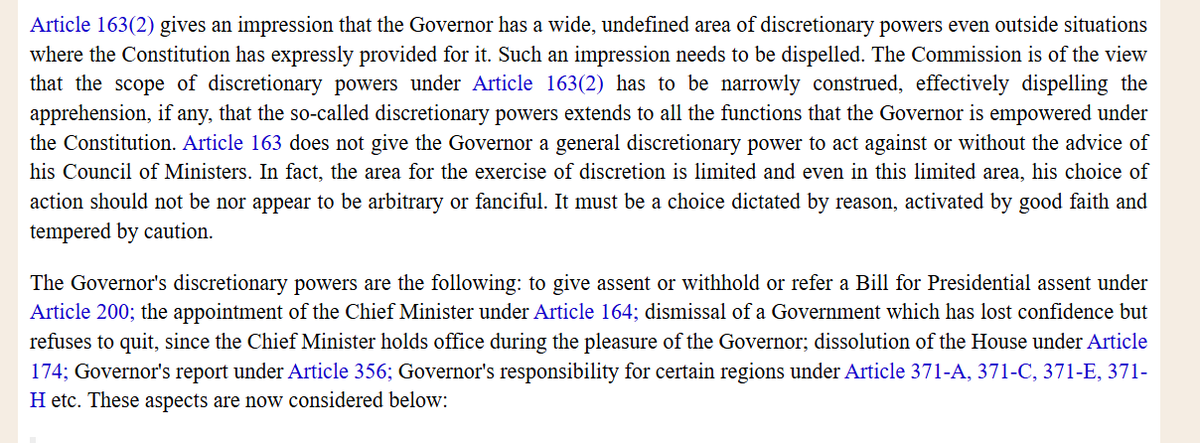
SG: This discussion in TN is directly dealing with the question of discretion.
J Nath: the TN judgment refers jumps to para 154, skips 151, 152
SG: real law in nebam rebia laid down in para 151, 152. Next BK Pavitra judgment referred, declared per incuriam. This itself was enough for an Article 145(3) reference.
J Nath: the TN judgment refers jumps to para 154, skips 151, 152
SG: real law in nebam rebia laid down in para 151, 152. Next BK Pavitra judgment referred, declared per incuriam. This itself was enough for an Article 145(3) reference.
@rashtrapatibhvn CJI: According to you, Article 200 Governor has ample discretion?
SG: it is wrong to say he is bound by aid and advice in every matter.
SG: it is wrong to say he is bound by aid and advice in every matter.
@rashtrapatibhvn SG: Mylords are right that every case, it is not necessary the Court will exercise Article 145(3) but this was a case where only issue was constitutional interpretation.
@rashtrapatibhvn SG: something very serious- one constitutional organ prescribing timeline for another constitutional organ-statutory functionaries can be bound by it, but would be apply to coordinate constitutional functionaries?
SG: wherever a timeline was stipulated, it was deleted. But wherever it was required, it added. The constitutional framers were conscious of it.
I have compiled constitutional provisions where Constitution itself stipulates timelimit- Article 209, etc. TN judgment, which mandatorily stipulates time limit relies upon Punchi and Sarkaria Commission, itself says these are our recommendations and we recommend appropriate constitutional amendments. Reliance may not be correct because commission does not say it has to be by judicial adjudication.
I have compiled constitutional provisions where Constitution itself stipulates timelimit- Article 209, etc. TN judgment, which mandatorily stipulates time limit relies upon Punchi and Sarkaria Commission, itself says these are our recommendations and we recommend appropriate constitutional amendments. Reliance may not be correct because commission does not say it has to be by judicial adjudication.
SG: There are judgments which I have cited that even in statutes, courts can't add, substitute or omit words. Court can suggest a competent legislature. One judgment, I am not reading, where J Narasimha was also in bench Supriyo v UOI. It was not reportable. It was the LGBT matter. Those judgments including electoral bonds cite this but this Supriyo judgment remains unreported. But important judgment laying down seminal questions of constitutional importance.
@rashtrapatibhvn SG: In some facts, the timelimit may be justified but justification can't confer jurisdiction.
@rashtrapatibhvn SG: In case of decision of nature Governor takes, it is poly-centric, it does not tick boxes. They may take some consultative process, there can be several reasons for delay.
P Ramachandran case referred- why time limit can't be prescribed in conclusion of criminal cases-
P Ramachandran case referred- why time limit can't be prescribed in conclusion of criminal cases-
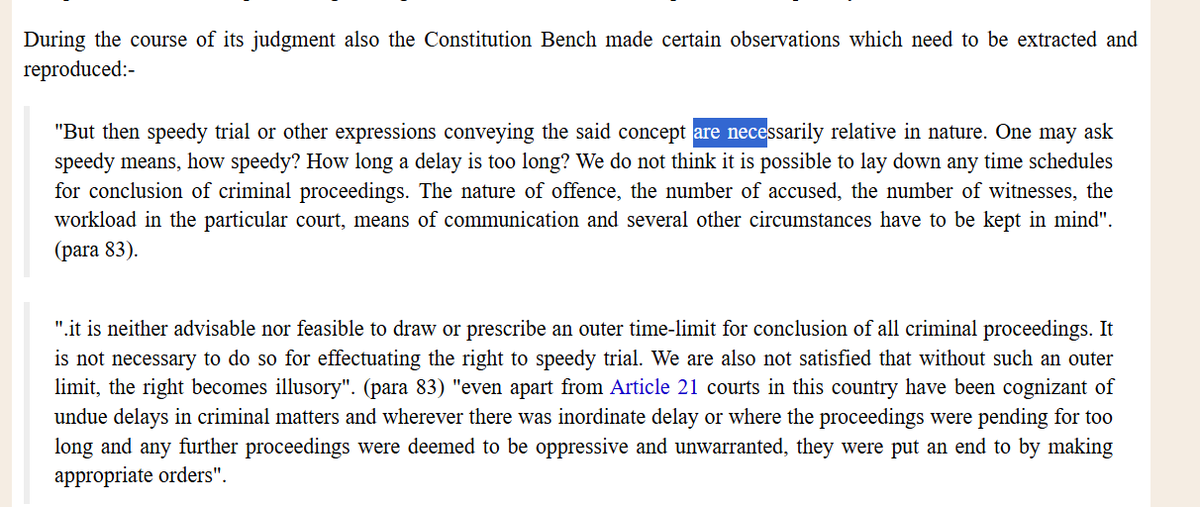
J Narasimha: you say there is nothing like pocket veto, though we can't specify a time limit, but there has to be a way the process works out.
SG: what you are pained at, it will not confer with jurisdiction. We are not flooded with cases which such instances have arised. One or two States have come. Remedy lies with the Parliament. Mylords have said, in view of this we request the Parliament but your lordship does not direct. That's constitutional comity..Suppose Governor is sitting over bills, there are political solutions and it is not everywhere the CM rushes to the Court. CM goes to the PM, telephonic it is sorted out. Such impasse is solved. But it will not confer jurisdiction to lay down time limit even if there is justification. Such issues are arising in last many decades, but statesmanship and political maturity allows them to keep the centre...they come together and a political solution is found.
SG: what you are pained at, it will not confer with jurisdiction. We are not flooded with cases which such instances have arised. One or two States have come. Remedy lies with the Parliament. Mylords have said, in view of this we request the Parliament but your lordship does not direct. That's constitutional comity..Suppose Governor is sitting over bills, there are political solutions and it is not everywhere the CM rushes to the Court. CM goes to the PM, telephonic it is sorted out. Such impasse is solved. But it will not confer jurisdiction to lay down time limit even if there is justification. Such issues are arising in last many decades, but statesmanship and political maturity allows them to keep the centre...they come together and a political solution is found.
SG: Suppose a bill is passed by Parliament that people of country is approaching that there trial is pending for 30 years, can the executive say there is a problem and your trial is treated to have been terminated, you have been deemed to have been acquitted. Justification can;t confer jurisdiction.
J Kant: Against inaction of Governor, it can vary from state to state, action to action, or inaction, if aggreived State approaches and according to you, the judicial review is completely barred?
SG: I am on timelimit.
CJI: if there is a wrong, there has to be a remedy
SG: for all problems, this forum may not be the solution
CJI: this court is the custodian of the constitution
SG: each organ is
CJI: if constitutional functionaries does not discharge function without any reason, are the hands of this court tied?
SG: I am on timelimit.
CJI: if there is a wrong, there has to be a remedy
SG: for all problems, this forum may not be the solution
CJI: this court is the custodian of the constitution
SG: each organ is
CJI: if constitutional functionaries does not discharge function without any reason, are the hands of this court tied?
J Kant: if power of interpretation vests in Supreme Court, then interpretation of law have to be tried by the court
SG: justiciability is something else, adding or constitutional interpretation is something else
CJI: we have to go on literal interpretation
SG: you can always call the law officer and say please do
J Narasimha: if extreme view is taken to argue that you can't do it, you say we don't have the power to do it at all, how do you make the Constitution work?
SG: justiciability is something else, adding or constitutional interpretation is something else
CJI: we have to go on literal interpretation
SG: you can always call the law officer and say please do
J Narasimha: if extreme view is taken to argue that you can't do it, you say we don't have the power to do it at all, how do you make the Constitution work?
SG: please see the directions in the Tamil Nadu judgment [reads it]. There are two things, the second direction that President and Governor will record reasons and if they don't follow time line, States can come to Supreme Court or HCs. This means one institution is directing the President to do it within some time. I respect the directions, there may be justification but it can't confer jurisdiction.
SG: on timeline, there is direct judgment of five-judge bench. Article 200 was considered from view of time line and it was not prescribed. Article 200 follows 201 and in 201, time line is prescribed. All provisions where it was necessary to prescribe timelimit, it is there. Only question is can it be prescribed by a judgment?
SG: the outgoing cabinet say, our tenure is over, give assent to the Bill but Governor may choose and say, let me wait for the fresh elections. Outgoing people who have lost their time in the electoral mandate may not have applied their mind.
J Narasimha: so the bill does not lapse
CJI: two judges bench ought to have considered it
J Narasimha: so the bill does not lapse
CJI: two judges bench ought to have considered it
@rashtrapatibhvn SG: it is cited, let me first show the facts of Purushottam.
@rashtrapatibhvn SG: even if the context was lapsing, I read the ratio. The pray was this that you provide a timeline otherwise it would lapse.
SG: Kesham judgment
CJI: All have held that the speaker is a tribunal and he is amenable to the jurisdiction of this Court. Right from Kihoton, it has been held that he does not enjoy immunity. Kesham judgment also does not lay down guidelines. An argument was made that in UP case that the court should exercise the power and itself qualification, the Mayawati judgment.
CJI: All have held that the speaker is a tribunal and he is amenable to the jurisdiction of this Court. Right from Kihoton, it has been held that he does not enjoy immunity. Kesham judgment also does not lay down guidelines. An argument was made that in UP case that the court should exercise the power and itself qualification, the Mayawati judgment.
@rashtrapatibhvn CJI: this court held that MLAs writting a letter from BSP that from SP Mulayam Singh should be made the CM itself was enough for disqualification.
@rashtrapatibhvn Sr Adv Kapil Sibal: five years, I have been saying Speaker is a tribunal
CJI: we said we don't want to create a situation of operation successful, patient dead.
CJI: we said we don't want to create a situation of operation successful, patient dead.
@rashtrapatibhvn SG: as soon as possible- I am giving a judgment, Abdul Munim.
Can manner of exercise of powers be prescribed?
J Narasimha: show us the portion of two judge bench where it has been
CJI: that may be valid when some members of executive exercises adminstrative powers
Can manner of exercise of powers be prescribed?
J Narasimha: show us the portion of two judge bench where it has been
CJI: that may be valid when some members of executive exercises adminstrative powers
@rashtrapatibhvn SG: directions is to the timeline, give reasons and States can approach the Court
CJI: that will in violation of time line
SG: to get mandamus issued.
CJI: that will in violation of time line
SG: to get mandamus issued.
SG: another important question- whether exercise of power of President under Article 111 or Governor under 200 and President under 201 justiciable? In my view, it is not justiciable. One than one judgment supports it. Power of assent is a legislative act and otherwise as coordinate constitutional organ, the power is not justiciable.
When we say, kindly take this as constitutional argument, in Britain the Courts can't go questions because of Parliamentary supremacy except for human rights. Fortunately, the Supreme Court of India is the most powerful as mylords can set aside constitutional amendment, legislations.
When we say, kindly take this as constitutional argument, in Britain the Courts can't go questions because of Parliamentary supremacy except for human rights. Fortunately, the Supreme Court of India is the most powerful as mylords can set aside constitutional amendment, legislations.
@rashtrapatibhvn SG: We have constitutional supremacy, but don't have Parliamentary or legislative supremacy.
CJI: Sovereign is the Constitution.
SG: Supreme is the Constitution.
CJI: Sovereign is the Constitution.
SG: Supreme is the Constitution.
@rashtrapatibhvn SG: While exercising justiciability, the submission is divided
1. nature of power
2. non-justiciablity as facet of the independence of three organs- certain functions are core functions
3. judicial restraint
1. nature of power
2. non-justiciablity as facet of the independence of three organs- certain functions are core functions
3. judicial restraint
@rashtrapatibhvn SG: why classical concept of judicial review will not apply? Hoechst Pharmaceuticals Ltd. v. State of Bihar referred.
@rashtrapatibhvn Hearing to resume at 2 pm.
@rashtrapatibhvn Bench assembled.
@rashtrapatibhvn SG: Suppose Governor feels it is repugnant to two central Act and sends it to President and it is found that it was repugnant to actually five central law- the main issue was can the assent be justiciable? 

SG: on the ground of doctrine of separation of powers and non-justiciable of coordinate constitutional organs- assent is granted in aid and advice, there is no dispute in view of Governor. Under Article 163 prohibits the court from inquiry on what advice the assent was granted.
Suppose assent is granted, according to two judgments, it is not justiciable. Suppose he chooses the first proviso that he sends to the assembly and after proviso operates and bill is presented with or without modification, it can be sent to the President. That can be a subject matter of challenge. Question is- when they are exercising legislative power- such multipronged attacked by judicial review is permitted? my submission is no.
CJI: either he grants assents or not, but governor withholds it for unlimited period
SG: withhold is permanent; please see title of Article 200. it is not justiciable the exercise of powers under Article 200 and 201
CJI:according to you it is totally out of judicial view?
J Kant: the court can't examine the assent, but here question is decision making process
Suppose assent is granted, according to two judgments, it is not justiciable. Suppose he chooses the first proviso that he sends to the assembly and after proviso operates and bill is presented with or without modification, it can be sent to the President. That can be a subject matter of challenge. Question is- when they are exercising legislative power- such multipronged attacked by judicial review is permitted? my submission is no.
CJI: either he grants assents or not, but governor withholds it for unlimited period
SG: withhold is permanent; please see title of Article 200. it is not justiciable the exercise of powers under Article 200 and 201
CJI:according to you it is totally out of judicial view?
J Kant: the court can't examine the assent, but here question is decision making process
@rashtrapatibhvn SG: multi-level challenge- grant of assent per se if its challenged, the return by Governor to assembly can then also be challenged. Governor can send without repugnancy. Suppose he chooses to refer it to president, that is also a decision under Article 200.
@rashtrapatibhvn SG: Provision also says desirability. For instance, age is under challenge. He says, make it to 21. The assembly would return it without accepting, then also that option is available. If its justiciable, it can be put to challenge.
@rashtrapatibhvn SG: my respectful submission, this being plenary legislative powers exercised by coordinate constitutional functionaries are outside the pale of justiciability.
SG: It is always safe to save the jurisdiction of this Court. This theory, separation of powers amongst coordinate constitutional functionaries is accepted in our Constitution. Please see Article 163(3). Suppose, the outgoing Gov hurriedly passed Bill, send to Governor, new Government is formed and its not the same Government. he may advise governor to withhold the assent like I want to have fresh mandate, the constitutional prohibition is, you can't go into the advice given. What is done by Governor after that is also non-justiciable.
SG: There are some communication inter-se constitutional functionaries which are beyond the examination by court. Governor's communication with President can't be examined. Similarily, any powers under Article 200 and 201 is outside judicial review, or non-justiciable. I should not use the word judicial review.
SG: the decision are polycentric in nature, the very nature is such that the court may not have judicially manageable standard. If there is assent, based on what the Court will examine whether it was rightly or wrongly given
There is constitutional comity, respect by one organ to another. There is no hierarchy. There are checks and balance. Legislative enactment is subjected to judicial review. Any decision by executive all subject to judicial review. But constitutional plenary powers in the nature of legislative, justiciability should be denied. I am placing reliance on Indira Gandhi v Raj Narrain.
There is constitutional comity, respect by one organ to another. There is no hierarchy. There are checks and balance. Legislative enactment is subjected to judicial review. Any decision by executive all subject to judicial review. But constitutional plenary powers in the nature of legislative, justiciability should be denied. I am placing reliance on Indira Gandhi v Raj Narrain.
CJI: that is micro-management of government function, that we can't...suppose a particular function is entrusted to governor, when this court has set aside the constitutional amendment which took away power of judicial review, with those judgments, can we say that however the highest constitutional functionaries may be, if it does not act, the court is powerless? Suppose an act passed by competent legislature, hon'ble governor sits over it, then?
SG: the court may not decide justiciabilty on extreme cases
SG: the court may not decide justiciabilty on extreme cases
SG: in that case, if Governor sits, the solution does not lie here. It lies in political spheres- these are all political decisions and they are solved in democratic manner. This organ has protected fundamental rights, you are custodian, but there are problems not solvable by judicial but by political democratic process. There are constitutional functionaries responsible and answerable at least every 5 years
CJI: hon'ble Governor is not answerable to anyone
SG: Governor is the most vulnerable office, he can be removed for any reason..if something happens in judiciary, the system takes care of in the administrative side.
J Narasimha: constitutional immunity is clearly worded in what decision, why withhold has taken place etc and all these stand on footing that there is constitutional immunity but we are referring to procedure prescribed, in regards to this, where is the immunity? Kesari hind, says there is no question of deciding the assent. the inquiry into the constitutional process of granting or not granting or referring, whether immunity applies never ending is the question.
CJI: hon'ble Governor is not answerable to anyone
SG: Governor is the most vulnerable office, he can be removed for any reason..if something happens in judiciary, the system takes care of in the administrative side.
J Narasimha: constitutional immunity is clearly worded in what decision, why withhold has taken place etc and all these stand on footing that there is constitutional immunity but we are referring to procedure prescribed, in regards to this, where is the immunity? Kesari hind, says there is no question of deciding the assent. the inquiry into the constitutional process of granting or not granting or referring, whether immunity applies never ending is the question.
SG: I am not saying immunity. In Bihar case, mylords held Governor was acting mala fide
J Narasimha: substitute it with judicial review
SG: I am saying justiciability
J Narasimha: put it justiciability then, you say only way to answer it is through political process?
CJI: powers under Article 356 are for temporary period and there are in built safeguards that it has to be placed before both House etc. In 200, if we hold Governor has complete power to hold for immemorial, what is the safeguard for duly elected?
J Narasimha: substitute it with judicial review
SG: I am saying justiciability
J Narasimha: put it justiciability then, you say only way to answer it is through political process?
CJI: powers under Article 356 are for temporary period and there are in built safeguards that it has to be placed before both House etc. In 200, if we hold Governor has complete power to hold for immemorial, what is the safeguard for duly elected?
@rashtrapatibhvn CJI: if he does not exercises proviso, it will make the legislature totally defunct.
SG: Article 356 is executive power. Yours is a concern, but this forum is not a solution. Solution is constitutional amendment but for now, the political process. Every State does not take the confrontational position...yourlordships are not flooded with States asking to examine their matters.
@rashtrapatibhvn SG: we would be creating a constitutional hierarcy, the buck will stop here.
SG: Governor exercises several powers but some are core functions in the nature of legislative powers. Suppose, SC decides 100 cases per month and several cases are changed in curative decision and even after that, some feel they have not justice. But buck will have to stop somehere.
@rashtrapatibhvn SG: State of Rajasthan v UOI referred.
@rashtrapatibhvn SG: precursor to Bommai, referred in TN judgment.
@rashtrapatibhvn SG: restraint in exercise of judicial powers of high constitutional functionaries is a facet of separation of powers, which is a basic structure of the Constitution.
SG: there judgments cited in TN judgment for justiciability-first Bommai-there the Court came to a conclusion that there are judicially manageable standards- it was in respect of Article 356.
Second judgment cited is Manipur Tribunal-Speaker is a Tribunal, he is amenable to judicial review. There is no dispute.
Another judgment is Perrivalam- if we can have judicial review of functions of President, why not here? But the case was about pardoning and not a political question.
These three judgments leads to no conclusion that it is justiciable. Hoesct judgment holds the field, that is my submission.
Second judgment cited is Manipur Tribunal-Speaker is a Tribunal, he is amenable to judicial review. There is no dispute.
Another judgment is Perrivalam- if we can have judicial review of functions of President, why not here? But the case was about pardoning and not a political question.
These three judgments leads to no conclusion that it is justiciable. Hoesct judgment holds the field, that is my submission.
SG: [refers to the question of President on justiciability] can someone come and say, this act under Articles 200 and 201 are justiciable?
CJI: if there is no decision...[reads the question]
SG: we have faced the case where court said the assent is deemed to be granted. first time, the Acts came into force on the assent of the Supreme Court. These Acts in TN mentions that Bills have been assented by the Supreme Court.
CJI: if there is no decision...[reads the question]
SG: we have faced the case where court said the assent is deemed to be granted. first time, the Acts came into force on the assent of the Supreme Court. These Acts in TN mentions that Bills have been assented by the Supreme Court.
@rashtrapatibhvn SC: In Kihoton, the Court said we will finally set it aside but we can't do anything as interim.
CJI: we are not in appeal over judgment, what is from day 1, if from four years...
SG: your interpretation can't be based on
CJI: we have petitions from two three states now, Kerala, West Bengal, Punjab...consider a suggestion where Governor ought to but sits over four years, what happens to democratic set up or the 2/3 majority by which the state is elected and represents will of people
SG: I would not like to answer....
SG: your interpretation can't be based on
CJI: we have petitions from two three states now, Kerala, West Bengal, Punjab...consider a suggestion where Governor ought to but sits over four years, what happens to democratic set up or the 2/3 majority by which the state is elected and represents will of people
SG: I would not like to answer....
@rashtrapatibhvn CJI: we are having petitions from four States
SG: there are problems but this may not be the solution
SG: there are problems but this may not be the solution
@rashtrapatibhvn J Narasimha: like how political executive came up with tenth schedule
SG: Parliament did it, there was a problem of aaya ram, gaya ram
SG: Parliament did it, there was a problem of aaya ram, gaya ram
@rashtrapatibhvn SG: NJAC was declared illegal, it was passed unanimously but your lordship protected separation of powers saying one member from executive can't be a part of it.
SG: [Are the decisions of the Governor and the President under Article 200 and Article 201 of the Constitution of India, respectively, justiciable at a stage anterior into the law coming into force? Is it permissible for the Courts to undertake judicial adjudication over the contents of a Bill, in any manner, before it becomes law?]-why this has arise? because two judge says it is prudent for the President to make reference to this Court because the question of repugnancy is a legal question.
@rashtrapatibhvn SG: assumes two fundamentally flawed questions- the president is unable to decide for herself whether there is repugnacy or not, and lordship will examine anterior to the assent of the Bill
@rashtrapatibhvn J Narasimha: this 12th question does not stand on its own
@rashtrapatibhvn SG: Kindly see the hazard. Suppose...
CJI: we will have to leave all other work and give advice to the President under Article 145(3)
CJI: we will have to leave all other work and give advice to the President under Article 145(3)
@rashtrapatibhvn CJI: if President want to seek advice is for the President to decide.
SG: deemed assent- this is a facet of Article 142-I am not citing any judgment. The question is, can this Court substitute itself and do what the other constitutional functionary is required to do?
Article 142 can't be used to amend the Constitution. Forget deemed assent for time limits etc. It is not a part of Article 142. You have used it to do complete justice when there is no legal solution.
We have collated provisions where deeming is provided by the Constitution. One question which J Narasimha asked in regards to Article 32 and 131, yourship may not like to answer. It can be kept open [question 14]
Article 142 can't be used to amend the Constitution. Forget deemed assent for time limits etc. It is not a part of Article 142. You have used it to do complete justice when there is no legal solution.
We have collated provisions where deeming is provided by the Constitution. One question which J Narasimha asked in regards to Article 32 and 131, yourship may not like to answer. It can be kept open [question 14]
@rashtrapatibhvn CJI: you know the nature of Article 32 petition we face everyday
Sibal: the question need not to be answered
CJI: we can take it some other time
SG: can I come back, let me take instruction
Sibal: the question need not to be answered
CJI: we can take it some other time
SG: can I come back, let me take instruction
@rashtrapatibhvn J Narasimha: where is the direction in TN judgment that in repugnancy, the President must seek opinion
SG reads the question
SG reads the question
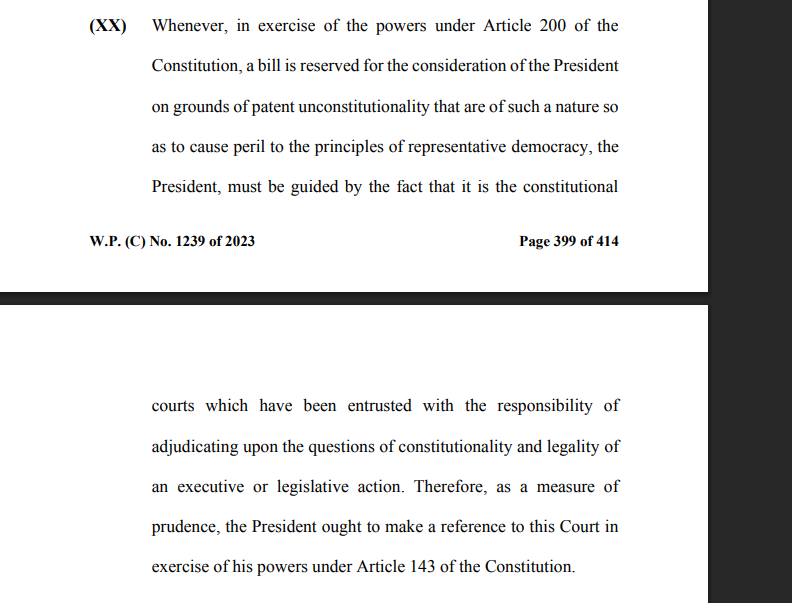
@rashtrapatibhvn SG: even repugnancy is to be decided by the Court, the question is can it be decided anterior to the passing of Bill.
SG Mehta concludes his submission.
Sr Adv NK Kaul will argue.
SG Mehta concludes his submission.
Sr Adv NK Kaul will argue.
Kaul, for State of MP: construction of Article 200, the issue of governor sitting over bill, not acting, I will deal with it later. On pure construction, our submission is there are three options in the main body of the Article, each have a finality and consequence attached to it. Each have to be preceded by affirmative action of declaration.
Kaul: 'shall declare'-the words used, and then words used are 'either' he assents
CJI: if Governor for time immemorial does not declare he is withholding, is the court powerless?
Kaul: let me first deal with construction and if situation emerges that Governor sits over for years, I will address.
Each actions have consequential effect-assent becomes Act; withholding assent- Bill falls; third part is it goes to the President. Fourth, more in nature of preliminary option, that is, as part of consultative process. There is a consultative process also envisaged that he sends recommendation that he wants them to reconsider, he may think there are constitutional issues or repugnancy. He thinks before sending to President, he sends to the House. What he can't do after is to withhold.
CJI: if Governor for time immemorial does not declare he is withholding, is the court powerless?
Kaul: let me first deal with construction and if situation emerges that Governor sits over for years, I will address.
Each actions have consequential effect-assent becomes Act; withholding assent- Bill falls; third part is it goes to the President. Fourth, more in nature of preliminary option, that is, as part of consultative process. There is a consultative process also envisaged that he sends recommendation that he wants them to reconsider, he may think there are constitutional issues or repugnancy. He thinks before sending to President, he sends to the House. What he can't do after is to withhold.
Kaul: the words in proviso are 'as soon as possible' 'after representation of bill'. the words as soon as possible, the constitutional framers imbided an expediency over it. It adds unless because if Governor gives assent, it naturally does not falls through, if he reserves, it is still a Bill. But only when he withholds, the Bill falls through.
@rashtrapatibhvn Kaul: the first words in Article 200 are positive affirmative action of 'shall declare'. But there is a preliminary option there but with ridder that the three options will be taken from you.
Kaul: the philosophy behind it, there is an inbuilt consultative mechanism. Dr Ambedkar while dealing with Governor advising said that the Governor has duty to advice
CJI: friend, philosphere and advisor
Kaul: he is not sitting as a rubberstamp. Word discretion may have not been mentioned but court has said he may not be bound by aid and advice and act in discretion.
CJI: friend, philosphere and advisor
Kaul: he is not sitting as a rubberstamp. Word discretion may have not been mentioned but court has said he may not be bound by aid and advice and act in discretion.
@rashtrapatibhvn Kaul: but to say, proviso means the moment you withhold assent, you are duty bound to send it back is wrong because the Constitution does not provide for it.
Kaul: just because it uses as soon as possible that it is adjunct to withholding is wrong. Under GOI, 1912, Section 12, return of Bill was an option, withholding was an option. It wasn't adjunct. The article said, instead of declaring or without, the words were he returns for consideration.
CJI: need not to go into pre-independence legislations
CJI: need not to go into pre-independence legislations
Kaul: I am saying proviso always existed as an option. It is historically an independent option. GOI, 1935 added the word discretion but Article 200 did not have discretion, the constitution benches have said the Governor has discretion. Constitution envisages back and forth between the State and centre. it is a whole process provided for.
@rashtrapatibhvn CJI: expression is not mention, more than one option is given, it shows he has discretion. In debates, Ambedkar said that Article 163 is to presume that whenever discretion is not used, can be presumed and not generalised.
@rashtrapatibhvn Kaul: J Kant asked if other options will fall otiose? Merely because you choose one, it does not make the other otiose.
J Kant: whether power of governor to withhold includes power to withhold temporarily?
Kaul: the proviso in a way out of the four is a preliminary option, all other three have a categorical finality.
CJI: so the Govenor can exercise proviso first and then either of the two?
Kaul: there may be cases where Governor feels the Bill can be assented but it needs some tweeking
Kaul: the proviso in a way out of the four is a preliminary option, all other three have a categorical finality.
CJI: so the Govenor can exercise proviso first and then either of the two?
Kaul: there may be cases where Governor feels the Bill can be assented but it needs some tweeking
@rashtrapatibhvn Kaul: proviso a necessary adjunct to withholding is wrong.
J Kant: what is the meaning and import of shall declare? formal, informal or implied declare?
J Kant: what is the meaning and import of shall declare? formal, informal or implied declare?
@rashtrapatibhvn Hearing will continue on August 29.
• • •
Missing some Tweet in this thread? You can try to
force a refresh

